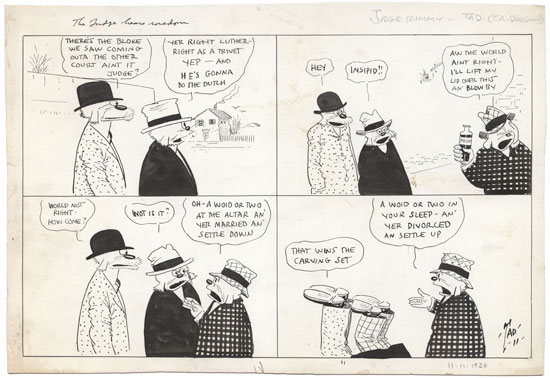(Click for lots bigger.)
Kind of a quickie here, but by now you probably don't need me to tell you the dimensions of this or how it was drawn; it's roughly the same as all the other Tads in my collection. This one was once in the Murray Harris collection, as were several of my other drawings. I assume the notations on the front are his, so I have no reason to doubt the accuracy of the title ("The Judge Hears Wisdom") or the date (November 11, 1920).
This is an above-average Judge Rummy strip, loaded with slang ("Right as a trivet"), almost to the point of incomprehensibility. It's a vaudeville-style divorce gag which I suspect may already have been stale by the time Tad used it, but you never know! It's always difficult to sort out which clichés Tad recycled from the ones he invented himself.
And, of course, I love the double-plop in the final panel.
UPDATE: I thought I'd clarify the final comment from Judge Rummy: "Wins the carving set" refers to a very common prize (sets of carving knives) in raffles, contests, etc. It has the exact same origin and meaning as the phrase "That takes the cake", which is, as you know, still very common today.

4 comments:
The last panel confused me. Why are the Judge and his friend upside down, and the carving set? So don't understand.
-tasha
Well, that's what "plop gag" means. It's a vaudeville trope, I suspect, that Tad adopted, where you fall over backwards because of a particularly bad or striking pun or joke. Cartoonists still use it to this day!
"Wins the carving set" refers to a very common prize (sets of carving knives) in raffles, contests, etc. It has the exact same origin as the phrase "That takes the cake".
Thanks for the explanation. It makes much more sense now that I knew they were falling backward/falling down/fainting from a bad joke. HA!!HA!!
I hope i wasn't the only confused one...I'm not worthy of this blog, but I'm not going anywhere!
-tasha
Tasha, the fact that you asked a question makes you super-double-worthy to be reading this blog.
Think of the "plop" as being part of the unique syntax of comics, like motion lines and sweat drops, things that really don't appear outside comics.
Post a Comment